Australia’s rising ‘Chillionaires’ who are finding success in China
Many Australians have seized the opportunity to make themselves millionaires by putting blood sweat and tears into getting into China. But being a ‘Chillionaire’ doesn’t come easy.
Leaders
Don't miss out on the headlines from Leaders. Followed categories will be added to My News.
Many Australians have seized the opportunity to make themselves millionaires by putting blood sweat and tears into getting into China.
But being a ‘Chillionaire’ doesn’t come easy.
It takes time and money to crack the Chinese market.
According to Austrade, China is Australia’s largest two-way trading partner with imports and exports totalling $194.6 billion in the last financial year, up 11.7 per cent year-on-year.
China is also Australia’s fifth most popular tourist destination with almost 600,000 visitors last year.
While there is a slow down in the Chinese economy, there are still opportunities for enterprising business owners and their products to crack this market.
The Australian Government has also just introduced a new round of tariff cuts from January 1 on 5418 products — from rock lobsters to tomato sauce — giving Australian exporters an even greater competitive edge.
These are just some of Australia’s business owners who have made a million dollar turnover from moving into China, or are on their way to the major milestone.
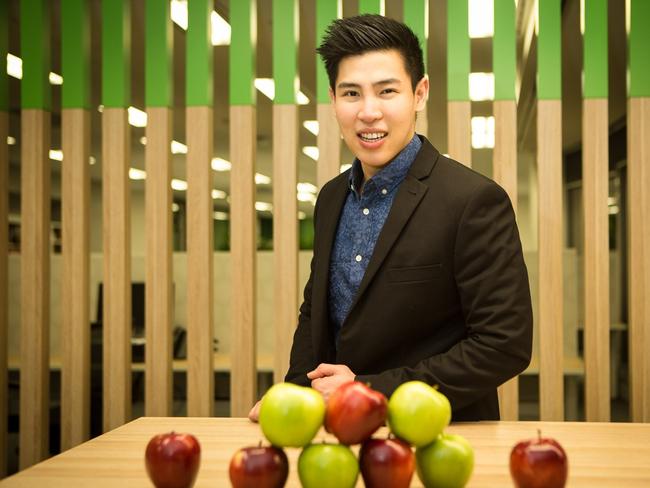
‘I DON’T WANT TO TRICK PEOPLE’
Dr Vincent Candrawinata is a “go-getter” who will do almost anything to achieve his dream — except sacrifice his integrity.
The Sydney-based scientist was the first person to find and secure the patent for the technology to extract antioxidant compounds from plants.
Using apples from the rural town of Orange, his company Renovatio extracts the antioxidants and sells it as an organic phenolic supplement to help people with inflammation.
He moved into China last year where they trialled it in retirement villages.
“We surveyed retirees’ health conditions and it did improve their wellbeing. Our product is very hard to explain so to show them how it works at the cellular level was important,” he said.
He has also secured his intellectual property to avoid getting copied and a trademark in China.
In the next six to eight months they are projecting to sell $500,000 worth of product in China.
Boston Consulting Group forecasts that China’s overall health and wellbeing market could be worth $A86.4 billion by 2020.
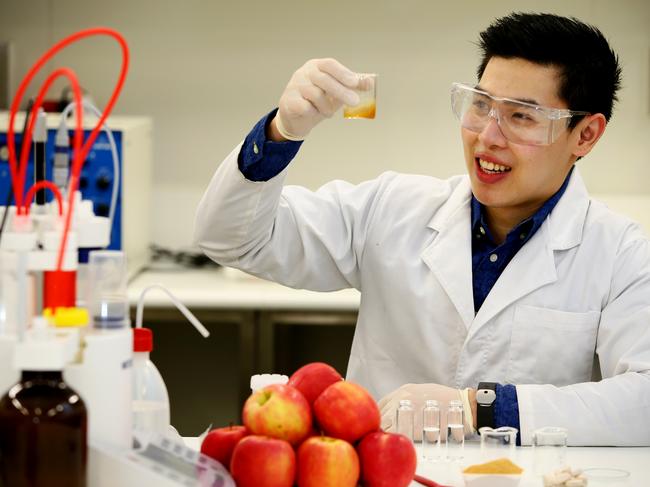
“We are on the way to making a million and we are one of few that still have an Australian-made logo as many others get ingredients overseas and pack it here,” he said.
“I’ve been approached by many people who want to water my product down to make more and sell more but I’ve said no because I don’t want to trick people.
“Our product is very expensive to make but it’s worth it because it works compared to other supplements.”
His advice for others is to understand regulations in China, secure your intellectual property and work with the right distributors.
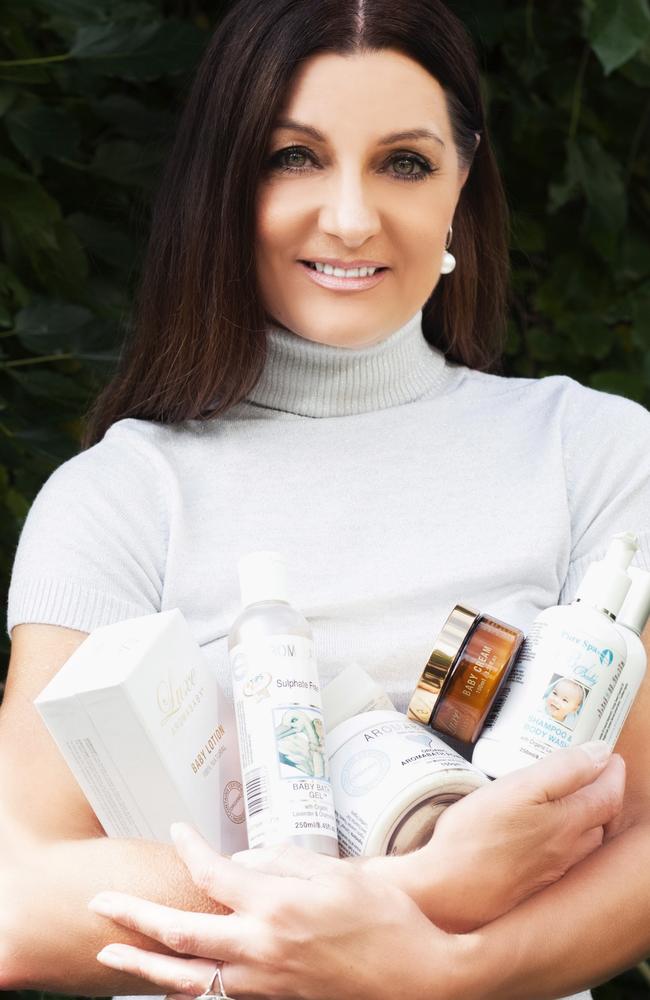
‘I’M THE CEO AND THEY LIKE TO TALK TO ME’
Catherine Cervasio, CEO and founder of AROMABABY, has already reached a million dollar turnover in China after entering the country 11 years ago.
Now, she’s just signed a deal that has the potential to be worth multi-million dollars over the next three years.
The single mother of two boys from Melbourne, Victoria, sells Australian-made natural and organic skin care products.
She has visited China many times and even been to consignment centres where new mothers get post-natal care from midwives to show them her product.
“We were first approached by buyers in China when they were looking for alternatives to chemical products to treat sensitive skin and conditions like eczema and dermatitis,” she said.
“I’m passionate about education and empowering women and I went to talk to them and the midwives so I could personally connect with them.”
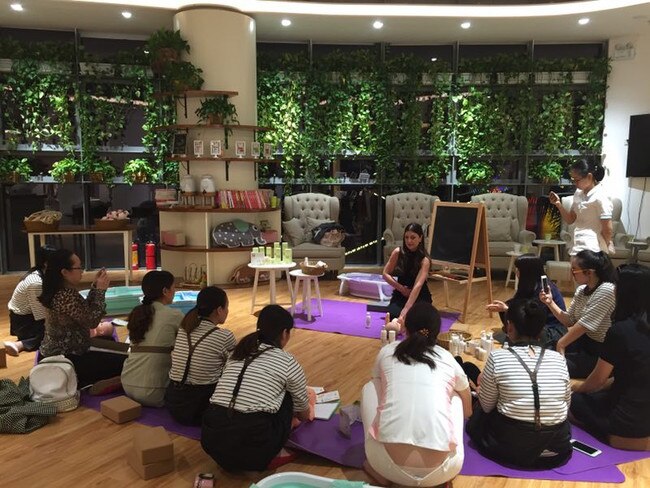
But Ms Cervasio said her business hasn’t always been about money and turnover.
“I had to put sales on hold in the early stages because I was raising my two beautiful boys,” she said.
“The Chinese want to know me, connect with me and understand the product — that’s how they trust you compared to someone just trying to make a deal.”
She said she only uses organic ingredients in her products that have a “beneficial purpose”.
“That’s why they’re quite expensive. But a Chinese person will pay for it if they know it will perform and they will keep coming back.”
Ms Cervasio said those keen to get into China must protect their IP, get trademarks early on and get on the ground there.
“Understand their buying habits, look at the competition, and ask yourself if you’re in it for the long haul as it won’t happen in two years. Seek expert advice if you need it,” she said.
“Go to the trade shows, give samples, you’ve got to put the effort in and have access to finance.”
“Be prepared to go there regularly. I’m the CEO and they like to talk to me. While I am learning Mandarin, it’s not essential to know the language as they’ll get a translator.”

‘OUR WINE IS A SUPER PREMIUM PRODUCT’
Dr Richard Hamilton, owner of Leconfield and Hamilton Wines in McLaren Vale, South Australia, told News Corp they entered the Chinese market in 2013 after China first came to them for their wines.
“They recognise the history and heritage of our wines and place a big value on that,” he said.
“They know their wines, and we did a few deals early on to get things going but decided discounting was not right.
“We chose to sell the best wine and they will pay a premium price for it because they know it won’t be second best.”
At the end of last year, the company had a million dollar turnover in profit from selling into China. He said they love their red wines as the colour red represents “good luck and warmth and wealth”.
Australian exports to China of bottled wine was valued at $877.4 million last year, which was an increase of 62.9 per cent from the year before.
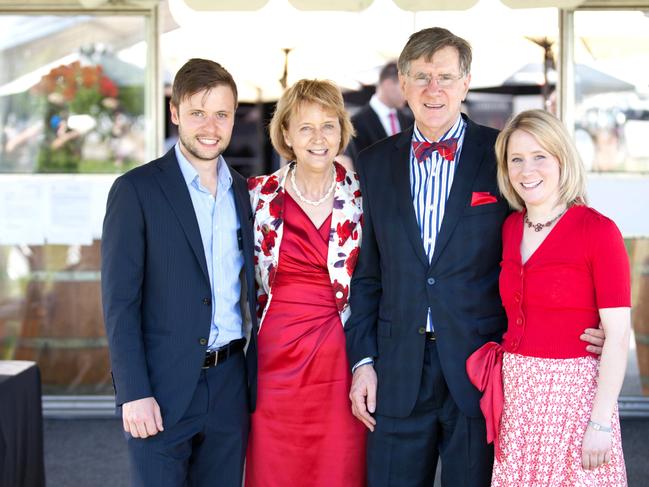
Wines that are popular in China are the Leconfield Coonawarra Cabernet Sauvignon, Leconfield McLaren Vale Shiraz, Richard Hamilton McLaren Vale Centurion Shiraz, Richard Hamilton McLaren Vale Little Road Shiraz, Syn Rouge, Richard Hamilton Watervale Riesling and Syn Cuvee Blanc.
“They will push you on price as they’re very competitive business people but one of our wines is made from a vine that’s from 1892 and it’s a super premium product.”
Dr Hamilton said they send their general manager to China and regularly talk to the Chinese about how they make the wine. They have it stocked in their restaurants, hotels and wine clubs.
He said they’ve also had lots of success after Chinese tourists have visited their winery.
“It costs money to keep these markets going but you have to keep going and build on it, we go to meet them, we do wine tastings for them and meet the customers,” he said.
He told those keen to export to China to “be patient”.
“It doesn’t happen overnight. Go through Australia’s diplomatic trade channels, and go to the trade shows in Hong Kong and China,” he said.
“Be frank, honest and passionate and be confident with your product and don’t undercut yourself.”
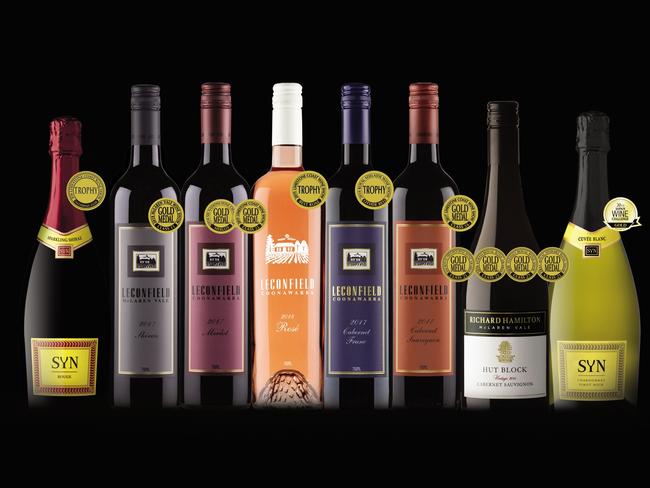
‘SHOW RESPECT TO THEIR CULTURE’
Lindy Andrews has only been in China for 18 months but said she “hasn’t even scratched the surface” of what’s possible.
The Gold Coast-based founder of Meditrav, a company that helps patients get medical treatment and wellness programs around the world, is on her way to a million dollar turnover in the Asian nation.
Austrade reports there been a growth in Australian services like Meditrav being exported to China, which totalled $16.9 billion in 2017-18 (up 17.2 per cent year-on-year).
Her company has 20 consultation companies in Shanghai, Beijing and Shenzhen where patients come to get access to hospitals and medical clinics in places like Australia.

“We are bringing Chinese patients to Australia for IVF treatment, health assessments, dental work and hip replacements,” she said.
“We give patients door-to-door service from picking them up in a private car to the airport, their visa, plane trip and their accommodation.
“We organise their medical treatment, people on ground 24/7 to help. We have translators, a concierge service, we even have people who help them while they’re convalescing to do their groceries.”
Ms Andrews said the Chinese are “cash-paying” and willing to invest to get the best health care.

“Health is their number one focus, it comes before family business and wealth and they will travel offshore to get help they can’t get in China,” she said.
“We also ask them what their interests are and can combine their treatment with going to a wellness retreat, a visit to the Gold Coast, golf, skiing or a wine tour of the Hunter Valley.”
Ms Andrews said it’s worth investing in having a Chinese partner who can help set up your company, and understanding their culture was essential.
“Take classes if you have to, I’m learning Mandarin but anything you can do to show respect to their culture helps,” she said. “Get as much funding as possible, we’ve invested heavily and it is paying off but you must have time on your side as it won’t happen automatically.”
‘THEY SEE AUSSIE BRANDS AS A STATUS SYMBOL’
Nick Ledowsky, co-founder and director of eRetail logistics, is helping Australian retailers sell their goods directly into China.
His global company “takes the pain” out of the process so retailers can sell direct to Chinese customers at half the price of using a competitor like FedEx or DHL.
Over the next six to 12 months, he said they are expected to generate $3-5 million as they continue to expand.
“Our platform offers a standard delivery time of 5-7 days from when we pick it up from the retailer to processing it and flying it to China, clear it through customs, get taxes and duties and final delivery,” he said.
“We have all the tracking a courier service would but with postal pricing.”
Mr Ledowsky, from Sydney, NSW, said they are helping retailers who currently sell apparel, food including baby formula and health supplements.
But getting into China hasn’t been easy.
“The laws in China have changed and there’s a registration process with Chinese customs that we help with so retailers’ products don’t get held up and the receiver doesn’t have to pay more tax and deal with import duties afterwards,” he said.
“We’re convincing Australian retailers that it’s a better customer experience if the consumer pays for everything at time of checkout online so when they land in China, they are not deterred by receiving extra charges they may not be not aware of.”
In advising business owners, he said they must understand if their product is suitable for the Chinese market.
“Some retailers are now selling products for pets and the middle class in China love dogs and are spending a fortune on dog treats and collars,” he said.
“They also love luxury, high-end goods, and they see Australian brands as being of high quality, almost like a status symbol.”
HOW TO BE A CHILLIONAIRE
● Know if your product is suitable
● Be prepared to commit for the long term
● Get your IP and trademarks
● Go to trade shows
● Have Chinese nationals on the ground to help
● Respect Chinese culture
● Be confident, offer a premium product and don’t undercut yourself
Originally published as Australia’s rising ‘Chillionaires’ who are finding success in China


